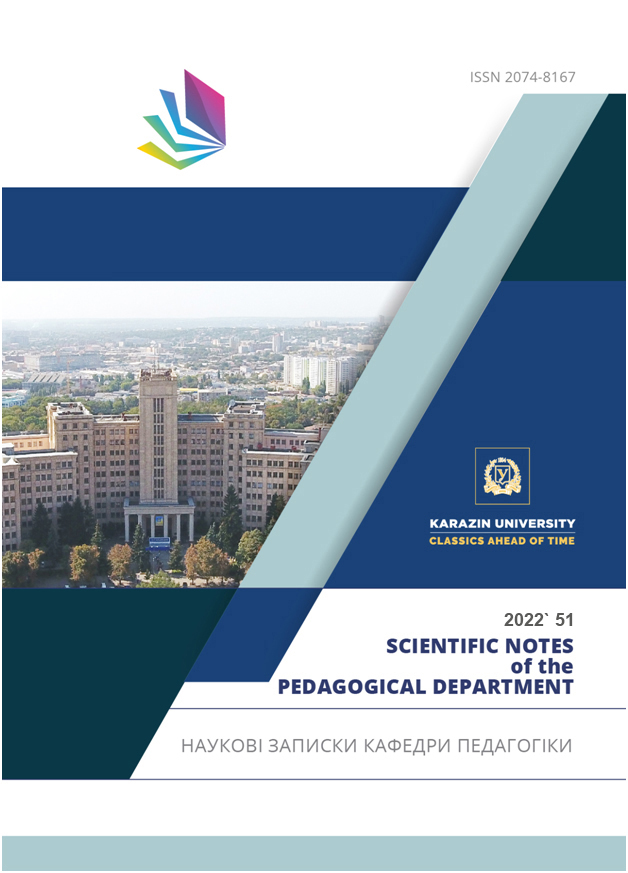Шість днів навчання. Шлях до зменшення ефективності освітнього процесу
Анотація
У цій статті мова йде про вплив чотирьохденного, п’ятиденного, шестиденного навчального тижня на продуктивність та академічні досягнення студентів, а також їх моральний стан. Ми розглянули такі надзвичайно важливі складові навчання, наприклад, як час навчання і зусилля, що впливає на процес рефлексії, а відтак ці складові визначають наскільки добре і глибоко студент засвоїть здобуті знання в університеті. У рамках дослідження було також проведено опитування, у якому взяли участь 165 студентів з різних факультетів Харківського національного університету ім. В. Н. Каразіна. Респонденти висловили свої судження з приводу шестиденного навчального тижня, його впливу на їх продуктивність, фізичний, нервово-психічний та морально-емоційний стан. Ми провели аналіз попередніх робіт та визначили, що від об’єму часу навчання витраченого на навчання не залежить результат академічної успішності (outcome), а навпаки цей процес пов’язаний з мотивацією, гарним настроєм, нервово-психічним станом, ступенями втоми та змоги відпочити. Також ми не оминули увагою аспект тривожності, тому опитали студентів щодо цього явища. 62% респондентів зауважили, що з початком шестиденного навчання в університеті рівень тривожності значно збільшився. Що неодмінно має негативний вплив на академічну успішність студентів, а також безпосередньо на процес навчання.
Завантаження
Посилання
/Посилання
Comenius J. A. The Great Didactic: Of John Amos Comenius. A. and C. Black. 1910.
Denham C., Lieberman A. Time to learn. Washington, DC: National Institute of Education. 1980.
Fraser W. J. & Killen R. Factors influencing academic success or failure of first-year and senior university students: do education students and lecturers perceive things differently? South African journal of education. 2003. 23(4). P. 254-263.
Hewitt P. M., Denny G. S. The four-day school week. The rural educator. 2018. 32(2).URL: https://doi. org/10.35608/ruraled.v32i2.431
Kleijn W. C., van der Ploeg H. M., Topman R. M. Cognition, study habits, test anxiety, and academic performance.
Psychological reports. 1994. 75(3). P. 1219–1226. https://doi.org/10.2466/pr0.1994.75.3.1219
Kreydun N., Nalyvaiko O., Ivanenko L., Zotova L., Nevoienna O., Iavorovska L., Kharchenko A., & Sevostianov P. The Quality of Education in the Conditions of Forced Distance Learning Caused by COVID-19. Revista Românească pentru Educaţie Multidimensională. 2022. 14(4). P. 423-448. https://doi.org/10.18662/rrem/14.4/
Macan T. H. College students’ time management: correlations with academic performance and stress. Journal of educational psychology. 1990. 82(4). P. 760-768. https://doi.org/10.1037/0022-0663.82.4.760
McMullen T. & Orlando M. Five or Six Day School Week?. The Effects of Schooling on Information Retention : 22nd Annual Student Research and Creativity Conference. 2020. SUNY Buffalo State. 7.
Moriña A., & Biagiotti G. Academic success factors in university students with disabilities: a systematic review. European Journal of Special Needs Education. 2022). 37(5). P. 729-746.
Nalyvaiko O., Vakulenko A., & Zemlin U. Features of forced quarantine distance learning. Scientific Notes of the Pedagogical Department. (2020). (47). P. 78-87. https://doi.org/10.26565/2074-8167-2020-47-09
Park C.-U., Kim H.-Y., Cha C.-P. A Discussion of schooling related 5-School-Day Week. Journal of fisheries and marine sciences education. 2012. 24(1). P. 79-94. https://doi.org/10.13000/jfmse.2012.24.1.079
Smith S. M., Rothkopf E. Z. Contextual enrichment and distribution of practice in the classroom. Cognition and instruction. (1984). 1(3). P. 341-358. https://doi.org/10.1207/s1532690xci0103_4
Stone A. A., Schneider S., Harter J. K. Day-of-week mood patterns in the United States: On the existence of Blue Monday, Thank God it’s Friday’ and weekend effects. The Journal of Positive Psychology. 2012. 7(4). P. 306-314. https://doi.org/10.1080/17439760.2012.691980
Walberg H. J. Synthesis of research on time and learning. Educational leadership. 1988. 45(6). P. 76-85.
Zajacova A., Lynch S. M., & Espenshade T. J. Self-efficacy, stress, and academic success in college. Research in higher education. 2005. 46(6), P. 677-706.
Comenius J. A. The Great Didactic: Of John Amos Comenius. A. and C. Black. 1910.
Denham C., Lieberman A. Time to learn. Washington, DC: National Institute of Education. 1980.
Fraser W. J. & Killen R. Factors influencing academic success or failure of first-year and senior university students: do education students and lecturers perceive things differently? South African journal of education. 2003. 23(4). P. 254-263.
Hewitt P. M., Denny G. S. The four-day school week. The rural educator. 2018. 32(2).URL: https://doi. org/10.35608/ruraled.v32i2.431
Kleijn W. C., van der Ploeg H. M., Topman R. M. Cognition, study habits, test anxiety, and academic performance.
Psychological reports. 1994. 75(3). P. 1219–1226. https://doi.org/10.2466/pr0.1994.75.3.1219
Kreydun N., Nalyvaiko O., Ivanenko L., Zotova L., Nevoienna O., Iavorovska L., Kharchenko A., & Sevostianov P. The Quality of Education in the Conditions of Forced Distance Learning Caused by COVID-19. Revista Românească pentru Educaţie Multidimensională. 2022. 14(4). P. 423-448. https://doi.org/10.18662/rrem/14.4/
Macan T. H. College students’ time management: correlations with academic performance and stress. Journal of educational psychology. 1990. 82(4). P. 760-768. https://doi.org/10.1037/0022-0663.82.4.760
McMullen T. & Orlando M. Five or Six Day School Week?. The Effects of Schooling on Information Retention : 22nd Annual Student Research and Creativity Conference. 2020. SUNY Buffalo State. 7.
Moriña A., & Biagiotti G. Academic success factors in university students with disabilities: a systematic review. European Journal of Special Needs Education. 2022). 37(5). P. 729-746.
Nalyvaiko O., Vakulenko A., & Zemlin U. Features of forced quarantine distance learning. Scientific Notes of the Pedagogical Department. (2020). (47). P. 78-87. https://doi.org/10.26565/2074-8167-2020-47-09
Park C.-U., Kim H.-Y., Cha C.-P. A Discussion of schooling related 5-School-Day Week. Journal of fisheries and marine sciences education. 2012. 24(1). P. 79-94. https://doi.org/10.13000/jfmse.2012.24.1.079
Smith S. M., Rothkopf E. Z. Contextual enrichment and distribution of practice in the classroom. Cognition and instruction. (1984). 1(3). P. 341-358. https://doi.org/10.1207/s1532690xci0103_4
Stone A. A., Schneider S., Harter J. K. Day-of-week mood patterns in the United States: On the existence of Blue Monday, Thank God it’s Friday’ and weekend effects. The Journal of Positive Psychology. 2012. 7(4). P. 306-314. https://doi.org/10.1080/17439760.2012.691980
Walberg H. J. Synthesis of research on time and learning. Educational leadership. 1988. 45(6). P. 76-85.
Zajacova A., Lynch S. M., & Espenshade T. J. Self-efficacy, stress, and academic success in college. Research in higher education. 2005. 46(6), P. 677-706.

